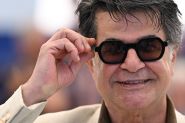
Exiled in Germany, Iranian filmmaker Mohammad Rasoulof sees his thriller The Seed of the Sacred Fig representing his host country at the Oscars. A recognition filled with gratitude and bitterness, reflecting his exile and the repression in Iran.
After his hasty escape from Iran, his latest film will represent Germany at the Oscars: a symbolic escape for director Mohammad Rasoulof, both grateful and overwhelmed by having to reach this point to have his art recognized. The Seed of the Sacred Fig, his paranoid thriller shot clandestinely in Iran, has enchanted critics and won the Special Jury Prize at Cannes.
However, the theocracy in power in Tehran did not submit this dive into a family torn apart by Iranian repression for the Oscar for Best International Feature.
“It’s obviously unimaginable for the Islamic Republic to present such a film at the Oscars,” Mohammad Rasoulof told AFP ahead of the film's U.S. release on Wednesday. “In fact, if it were possible, the film would never have existed.”
It is Germany, where the filmmaker is exiled, that is propelling this feature into the race for the statuettes, with high expectations for a nomination. The film was financed by French and German production companies. “I am thrilled that Germany saw the international scope of the film and embraced it,” Rasoulof continues. “It’s like carrying a torch, a signal for filmmakers working under constraint worldwide.”
But the director admits to feeling “bittersweet” about the situation: “I have quite contradictory feelings.”
A Dive into Repression
The film is set against the backdrop of the "Woman, Life, Freedom" movement, during which hundreds of people were killed, according to NGOs.
It follows Iman, an investigative judge serving the Islamic Republic, as unrest erupts after the death of Mahsa Amini, who was arrested in late 2022 for not complying with strict religious dress codes.
Iman’s wife, Najmeh, keeps ties with their two rebellious daughters, Rezvan and Sana, who secretly support the protests without participating.
Initially hesitant to sign execution orders for protesters without evidence, Iman faces growing pressure from the regime, fueling his distrust of the youth. When the gun entrusted to him goes missing, his apparent paranoia shatters his family.
Forced Exile
At the Cannes premiere of the film, Mohammad Rasoulof had just fled Iran on foot, crossing mountains to reach Europe. Sentenced to eight years in prison for “collusion against national security” after criticizing authorities’ “corruption” and “incompetence,” he had already spent time behind bars.
Actress Soheila Golestani, who plays Najmeh, remains in Iran and is under “the greatest pressure,” the filmmaker notes.
According to Rasoulof, legal actions against Iranian filmmakers have intensified in recent weeks.
A Contrasting View of Cinema
The film officially selected by Iran for the Oscars, The Seed of the Sacred Fig, is described by state media as a drama showcasing “the beauty” of the country and “the authenticity of the Iranian family.”
Rasoulof expresses little interest in such productions “made under the dictates of Iranian censorship.”
“They tend to be far from reality. Watching them, you feel as though your intelligence is being insulted,” he criticizes.
His thriller, in contrast, draws on Hollywood influences, notably Straw Dogs by Sam Peckinpah and The Shining by Stanley Kubrick: “I enjoyed playing with genres and blending them in a new way.”
The filmmaker is currently working on an animated film about Abbas Nalbandian, an engaged playwright who lived through pivotal experiences during the Iranian revolution.
Accustomed to directing his films remotely to bypass censorship, Mohammad Rasoulof hopes to complete this project despite his exile.
“It’s very hard to realize that this has already lasted six months,” he confides. “I miss Iran a lot.”
With AFP


Comments